Growing up, I remember seeing jars of red berries at the dry fruits market. Who knew those berries would be TikTok famous?
Their sweet and sour flavor already had our hearts, but their newly discovered benefits made them a pantry staple. Remember, their vibrant red hue instantly lights up any dish.
Yes, we’re talking about the famous goji berries today!
Recently, I found a video of a fellow bird parent offering their bird goji berries as a treat. And that got me thinking: Are goji berries safe for birds?
After extensive research, I got to some fascinating findings. Birds can eat Goji Berries. But how much effect do they have on our feathered friends? Let’s explore a detailed answer!
Are Goji Berries Safe for Birds?
Goji berries are native to Asia and most recently came into popularity (all thanks to TikTok nutritionists) for their innumerable benefits.
These berries are recommended worldwide for people struggling with health and have been a pantry staple in many households.
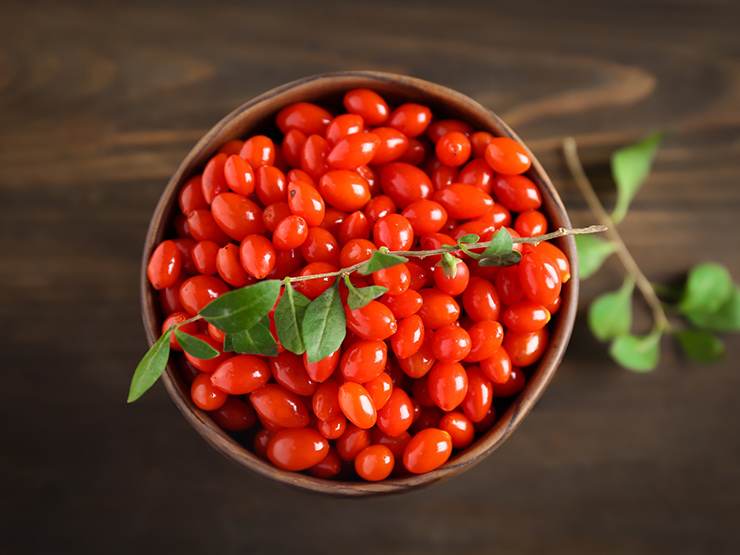
Birds are just like humans when it comes to food. Things that are unhealthy for them are usually the things they love, which is why bird parents need to opt for healthy options that are just as tasty.
Good news for all the bird parents who struggle with this: the all-in-one goji berries are safe for birds.
Yes, you heard it right!
To know more about the exceptional benefits goji berries offers, let’s look at the next section.
What Are the Nutritional Benefits of Goji Berries?
Are you ready to explore all the incredible nutrients that make goji berries famous? Well, the wait is over!
Goji berries are known for being packed with antioxidants and delivering essential micro-nutrients all at once.
Here is a detailed list of nutrients goji berries offer:
- Vitamin A
- Calcium
- Protein
- Fiber
- Iron
- Vitamin C
1. Vitamin A
Goji berries are chock full of vitamin A. To be more precise, they contain up to 501% of Vitamin A per serving.
Vitamin A is a fat-soluble vitamin that is a highly beneficial antioxidant required to regulate your bird’s vision, immune system, and skin health.
A deficiency in vitamin A can lead to musculoskeletal diseases, skin and feather infections, and egg binding.
For young birds or one struggling with vitamin A deficiency, goji berries should be a must-have in their diet.
2. Calcium
If you’ve been a bird parent for a while now, you’re aware of the dangers that dairy can hold in your bird’s diet.
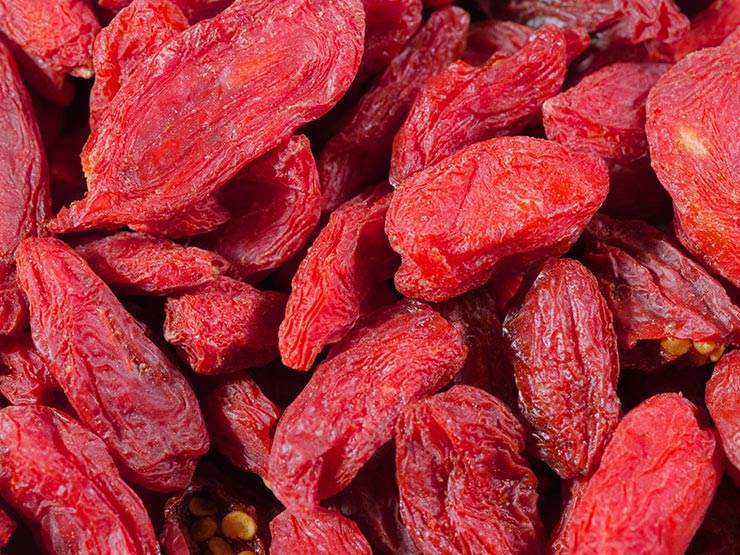
Birds are lactose-intolerant, which makes it impossible for their gut to metabolize food with dairy. It has been an abiding concern in the bird community as a lack of calcium can be deadly in young birds.
However, recent research has proven that many vegetables and fruits can contain higher amounts of calcium than even dairy can offer.
Goji berries are the runner-up in that list as it provides up to 190mg of calcium per serving.
Calcium is essential for building and maintaining bone health, especially for young birds. Despite bone health, calcium is also responsible for regulating other vital organs.
A deficiency in calcium (also known as hypocalcemia) can lead to musculoskeletal diseases, fatigue, paralysis, and immobility in the wings. Hence, keep your bird’s calcium intake up to mark at all ages.
3. Protein
Every bird parent knows the key to any bird’s diet is having a sweet balance between protein and fiber. Goji berries help you achieve just that.
With each serving containing up to 4 grams of protein, goji berries contain an exceptional amount of protein not seen in other berries.
Protein is the building block of muscles required for growth. Without protein, birds will face problems such as stunted growth, low bone density, and anemia.
A deficiency of protein has been a leading cause of death in hatchlings.
4. Fiber
How can goji berry be perfect if it doesn’t fulfill the holy grail of nutrients required in a bird’s diet?
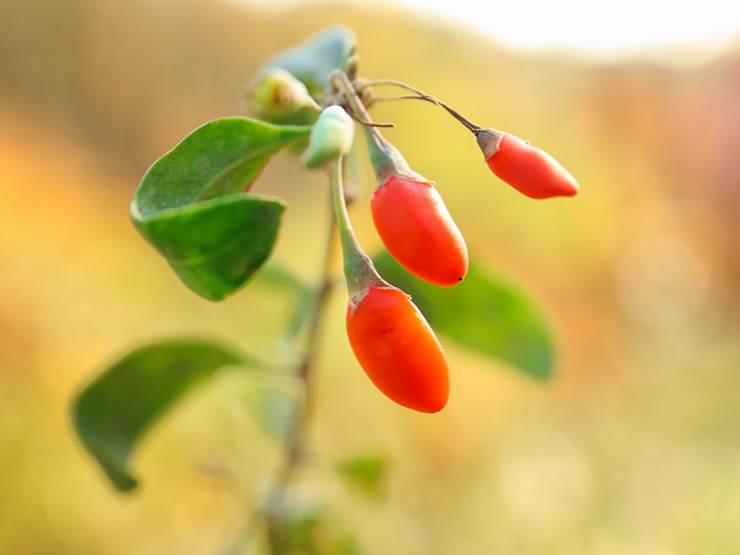
With 3.6 grams of fiber per serving, goji berries will ensure your bird doesn’t face any digestion issues.
Fiber is a crucial part of a bird’s diet as birds have a weaker digestional system, unlike the rest of the animal kingdom. Fiber provides roughage to prevent tears in the intestines and other gastrointestinal diseases.
Don’t forget to check on your bird’s fiber intake now!
5. Iron
The necessity of iron and protein goes hand in hand. Iron is one of the most vital minerals required for your bird as it aids growth and development by making hemoglobin (an essential protein to carry oxygen).
A deficiency of iron can lead to severe anemia in birds. Fatigue and loss of sleep can also be other symptoms of iron deficiency.
To prevent iron deficiencies, goji berries will be perfectly handy as it contains up to 11% of the daily value required. And that is just for humans; imagine how beneficial it will be for your birds.
6. Vitamin C
A berry can’t be a berry without being jam-packed with vitamin C, right? Just like everything else, goji berries deliver that efficiently.
Vitamin C is one of the primary antioxidants to prevent skin infections and boost the immune system.
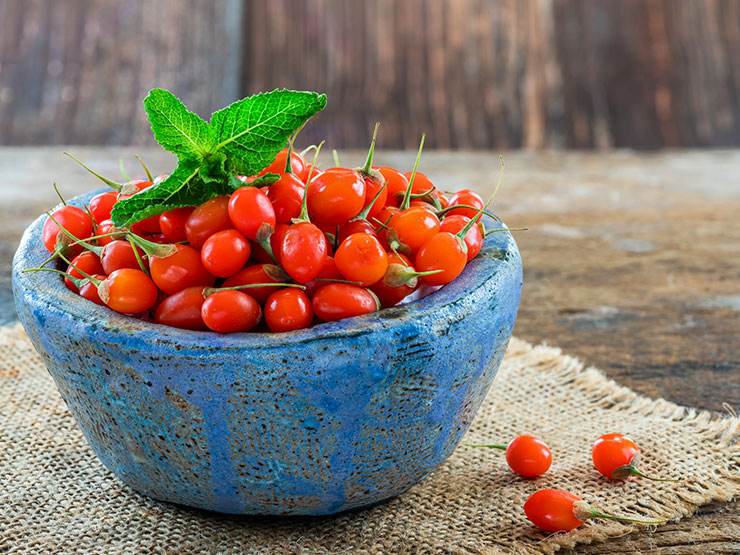
Goji berries contain up to 15% of DV vitamin C, making them a perfect source.
With all the benefits noted, how can anyone not love a good goji berry? Now you know what all of the TikTok hype for goji berries are about, but the best part is; they’re impeccable for your bird’s health.
Are There Any Side Effects of Goji Berries?
With a berry full of beneficial nutrients, can there be any downside to goji berries?
It’s crucial to remember birds have delicate digestive systems. They cannot metabolize all foods due to the absence of essential enzymes.
Before adding any new food to their diet, remember to assess their safety first.
1. Can Excessively Reduce Blood Sugar Levels
Although goji berries are high in sugar, with a whopping 21.8g in each serving, the high iron significantly decreases blood sugar levels.
The most concerning part of this side effect are how insignificant the symptoms can look in birds, considering their size.
One of the most common symptoms to look out for is fatigue and lethargy.
2. Can Cause Severe Allergies
Research has found that goji berries have strong allergenic potential and high cross-reactivity with tomatoes, tobacco, nuts, and Artemisia. It’s necessary to look out for other allergens when adding goji berries to your bird’s diet.
Symptoms may include airway obstruction and gastrointestinal issues.
How to Prevent These Side Effects?
As always advised, check in with your vet before adding any new food to your bird’s diet. Besides, consumption in moderation will not be advisable.
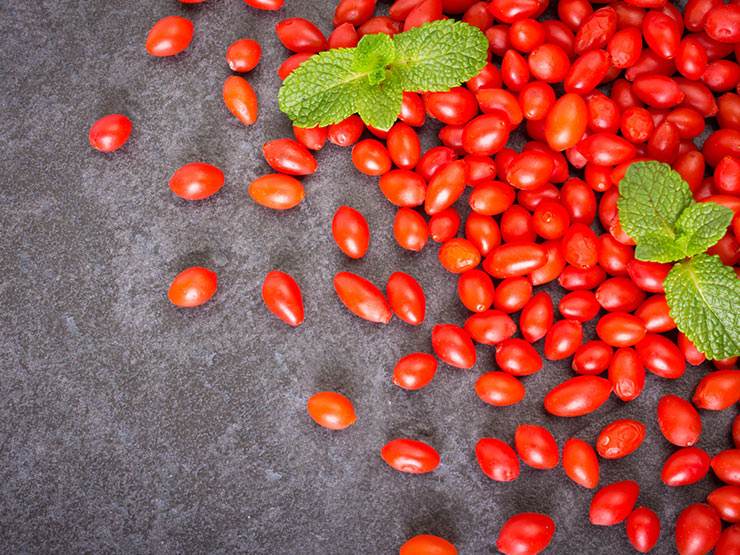
Even if your bird is not allergic to anything, add the tiniest amount and look out for symptoms.
There’s no need to be worried about the side effects as the benefits far outweigh the risks.
Frequently Asked Questions
Let’s answer some of the popular queries on Goji Berries and birds.
Can Birds Eat Raw Goji Berries?
Birds will surely enjoy the perfectly safe raw goji berries. Unfortunately, raw goji berries are only available in Asia. Nonetheless, raw goji berries will be rare to find on other continents.
Can Birds Eat Dried Goji Berries?
The good news for those who live out of Asia, dried goji berries will be widely available. They are safe for consumption as well. Another perk of dried goji berries is that they can be a perfect addition to bird feeders.
Birds require a high amount of vitamin A during the breeding season to prevent egg binding. Adding dried goji berries to your bird feeder during the breeding season will do just the trick.
Can Wild Birds Eat Goji Berries?
Wild birds in Asia go berserk as soon as it’s goji berries season. Who will miss out on a sugar high?
Birds scavenge vegetables and fruits with the required nutrients to stay healthy. Goji berries are a fan favorite amongst birds during breeding season as wild birds actively seek them out.
Final Remarks
Goji berries are the ultimate berry; when it comes to pairing tasty with healthy.
If you have a bird struggling with vitamin deficiency: goji berries will be the perfect remedy. They are full of an insane amount of Vitamin A, C, and Iron and are the holy grail for birds (as they contain fiber and protein).
For the risks, it is advisable goji berries remain as an occasional treat and remedy. Don’t forget to add it in moderation to your bird’s diet.
Just to be clear, there’s no vitamin A in goji berries. Nor any in carrots, for that matter
Plants can’t contain actual, retinol, vitamin A.
What they contain is beta carotene, which is not vitamin A/retinol, but can be converted into retinol by SOME animals, mainly herbivores, and to a lesser extent omnivores.
This means that many birds don’t convert beta carotene into retinol well…just like humans do not. Humans, being meat-leaning omnivores, are better off consuming actual retinol than converting beta carotene to retinol, as we do so with less efficiency.
Not really objecting to anything you said, but clearing up the myth of carrots/goji containing “vitamin A”, or of beta carotene BEING vitamin A.